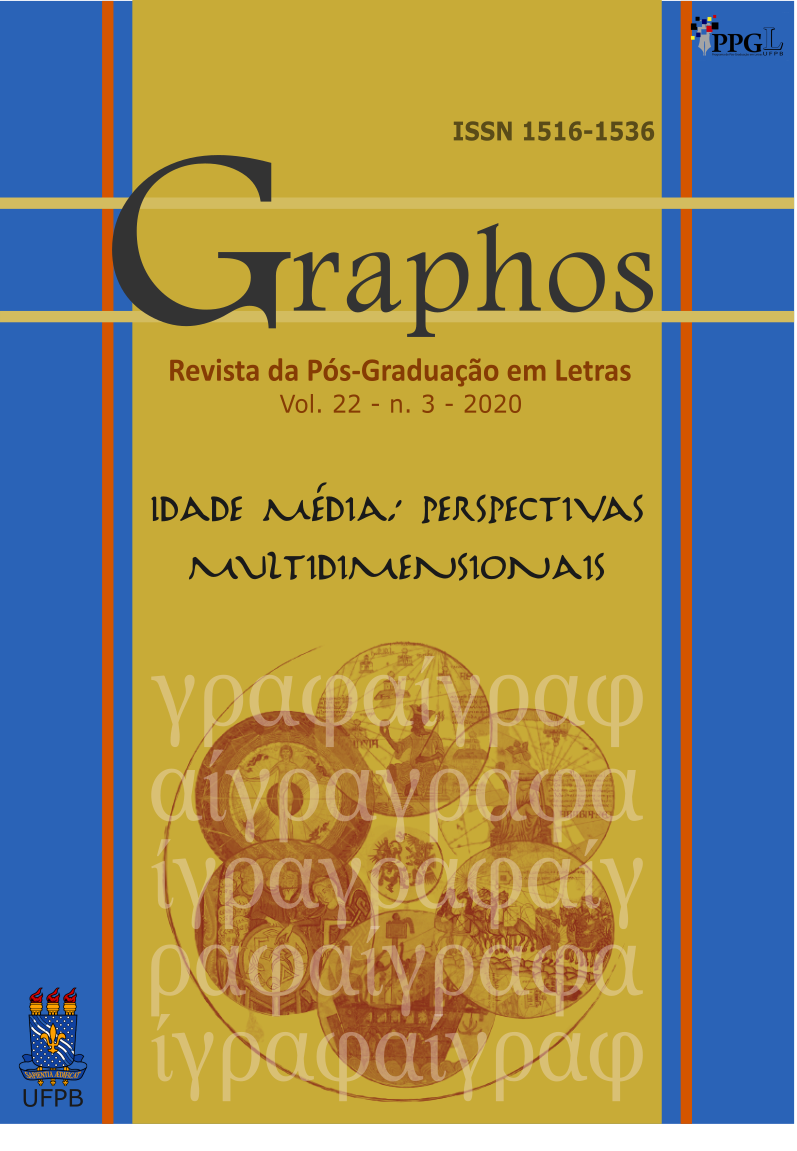In search of another medieval imagery: on the background of literature (a look from the new medievalism)
DOI:
https://doi.org/10.22478/ufpb.1516-1536.2020v22n3.54126Keywords:
New medievalism, Studies of imageries, Medieval Literature, HistoryAbstract
Treating the Middle Ages presents a dilemma: which referential should be adopted when trying to approach this period of our history? Since its presumed end, the Middle Ages have been the object of many, often unfavorable, criticisms, carried out under the protection of great intellectuals of each era. For the humanists, the period offered nothing relevant; for the intellectuals of the 18th century, the Middle Ages, had nothing to contribute. It seemed that the hope that housed the rescue of local traditions and legends would provide, during the romanticism, a propitious environment to soften the attack against the Middle Ages; however, for most intellectuals, the idealization of the period diverted the focus and created a fantasy of knights, tournaments and high doses of courtesy. The revisionism of the 20th century considerably helped to rethink this historical distortion and tried to redeem, or, at least, reconcile the narration of historical events through the clearer vision offered by the study of daily life, the mentalities in the configuration of the medieval imagery. It is up to the current century to go on and rethink the information about this period, through theoretical lines such as New Medievalism and its multidisciplinary proposals. A new century for a new medieval imagery. This paper aims to contribute for the discussion by treating four aspects that have allowed to see a possible new imagery revealed between the lines of history and the literary creation: utopia, courtly love, the female image and the chivalric ideal.
Downloads
References
AURELL, J. El nuevo medievalismo y la interpretación de los textos históricos. Hispania. Revista Española de Historia, Navarra, v. 66, n. 224, p. 809-832, set./dez. 2006.
_______. La historiografía medieval. Entre la historia y la literatura. Valencia: PUV, 2016.
_______. Medievalismo y medievalistas en el siglo XX. Anuario de Historia de la Iglesia, Navarra, v. 13, p. 383-386, 2004. Disponível em: .Acesso em: 20 jun. 2020.
BARROS, J. D. A. A poética do amor cortês e os trovadores medievais - caracterização, origens e teorias. Aletria, Belo Horizonte, v. 25, n. 1, p. 215-228, 2015. Disponível em: . Acesso em: 20 jun. 2020.
BARROS, J. D. A. O Amor Cortês – suas origens e significados. Raido, Dourados, MS, v. 5, n. 9, p. 195-216, jun. 2011. Disponível em: <https://ojs.ufgd.edu.br/index.php/Raido/article/view/979#>. Acesso em: 20 jun. 2020.
CAPELAO, A. Tratado do amor cortês. São Paulo: Martins Fontes, 2000.
CASTIGLIONE, B. El cortesano. Madri: Ed. Espasa, 2000.
DUBY, G. Eva y los sacerdotes. Madri: Alianza Editorial, 1998.
ESTRADA, F. L. Introducción a la literatura medieval española. 5. ed. Madri: Editorial Gredos, 1983.
FACINA, A. Literatura e sociedade. Rio de Janeiro: Jorge Zahar, 2004.
FRANCO JR., H. A Idade Média: nascimento do ocidente. 2. ed. rev. e ampliada. São Paulo: Brasiliense, 2001.
FRANCO JR., H. As utopias medievais. São Paulo: Brasiliense, 1992.
GARCÍA, A. R. La Edad Media. Un concepto problemático y multifuncional. Destiempos. Revista de Curiosidad Cultural, n. 38, p. 7-16, 2014. Disponível em: <https://dialnet.unirioja.es/servlet/articulo?codigo=4671581>. Acesso em: 20 jun. 2020.
LE GOFF, J. A história deve ser dividida em pedaços? Tradução de Nícia Adan Bonatti. São Paulo: Editora Unesp, 2015.
LE GOFF, J. Para um novo conceito de Idade Média. Tradução de Maria Helena da Costa Dias. Lisboa: Editora Estampa, 1979.
LE GOFF, J. ¿Realmente es necesario cortar la historia en rebanadas? Cidade do México: Fondo de cultura económica, 2016.
LE GOFF, J. Uma longa Idade Media. Tradução de Marcos de Castro. Rio de Janeiro: Civilização brasileira, 2008.
MACEDO, J. R. Imaginário carnavalesco, riso e utopia nos Fabliaux medievais. Revista de História, São Paulo, n. 132, p. 19-28, 1995. Disponível em: . Acesso em: 20 jun. 2020.
MINGUEZ, C.G. La construcción de la Edad Media: Mito y realidad. Palência: PITTM, 2006. Disponível em: <https://es.scribd.com/document/207585549/Dialnet-LaConstruccionDeLaEdadMedia-2335958>. Acesso em: 09 set. 2020.
SOLARES, B. La investigación del imaginario medieval. Cultura y representaciones sociales, Cidade do México, v. 1, n. 2, p. 139-152, 2007. Disponível em: . Acesso em: 10 out. 2020.
PERNOUD, R. O Mito da Idade Média. Tradução de Maria do Carmo Santos. Lisboa: Publicações Europa – América, 1978.
POWER, E. Mujeres medievales. Madri: Ediciones Encuentro, 1979.
RICO, F.; DEYERMOND, A. Historia y critica de la Edad Media. Barcelona: Ed. Crítica, 1979.
RODRÍGUEZ, G. Los milagros en la religiosidad hispánica (siglos XIII al XVI). Bulletin du centre d’études médiévales d’Auxerre - BUCEMA, Auxerre, n. 2, 2008, disponibilizado em linha em 13 jan. 2009. Disponível em: <http://journals.openedition.org/cem/9002>. Acesso em: 04 dez. 2020. DOI : https://doi.org/10.4000/cem.9002.
Downloads
Published
Issue
Section
License
Copyright (c) 2020 Juan Ignacio Jurado Centurion Lopez

This work is licensed under a Creative Commons Attribution 4.0 International License.







